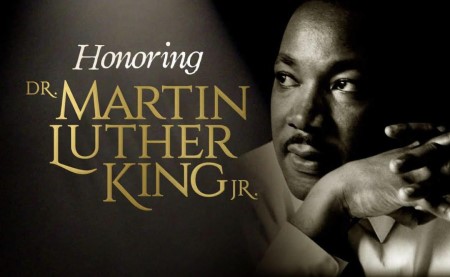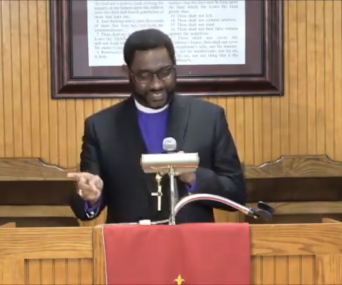
BY MIKE FUHRMAN
More than 50 years have passed, but Bishop Lonnie E. Gray recalls the events of April 4, 1968, in vivid detail.
He was a junior at a segregated high school in nearby Cleveland on that fateful day when he and the other Black students were suddenly called to the auditorium by Principal George Knox.

“We had no idea why we were being called out of our class, but at that point — many of us students — we were just overjoyed just to get out of class,” Gray said.
After he joined his friends in the auditorium, they were instructed to be seated and be quiet.
“With tearful eyes, Principal Knox announced that Dr. Martin Luther King had been assassinated,” Gray said. “All of our joy and laughter turned into sadness. … There was not a dry eye in the auditorium that day.”
Gray, the founder and pastor of First Resurrection Church of God in Statesville, delivered the keynote address during Monday’s 27th Annual MLK Community Prayer Breakfast. The event, which was held virtually to prevent the spread of COVID-19, was streamed on Facebook, Teams and YouTube.
Troutman Middle School student Andrew Harris welcomed the audience and shared his enthusiasm for reading and learning about MLK.
“Dr. King worked hard to ensure that people like me had equal rights and fair treatment,” Andrew said. “I pray that I and other young men like me will continue to embrace his legacy and work hard to achieve a legacy of our own.”
He shared one of MLK’s famous quotes:
“If you can’t fly, then run. If you can’t run, then walk. If you can’t walk, then crawl. But whatever you do, you have to keep moving forward.”
Remyan Gray, a Winston-Salem State University graduate, delivered the invocation and the South Iredell High School MJROTC presented the colors before Mayor Costi Kutteh read a proclamation declaring January 17, 2022, as Dr. Martin Luther King Jr. Day in Statesville.
“Dr. King moved millions of Americans to act toward profound social change,” the mayor said. “We join the nation in celebrating the life and legacy of Martin Luther King Jr., and we honor his memory by reaffirming our dedication to upholding his dream for all of America.”
In his keynote address, Bishop Gray touched on the “sense of loss, overwhelming hurt and hopelessness” that he and millions of others felt after MLK’s assassination.
The death of the civil rights leader came a few months before his high school was set to close and Black students would begin integrating into the public school previously attended only by white students.
It was a troubling time that left Gray with many questions — “How can we face all the racism? How can we overcome the rejection? Would we be able to get through day to day with all the white teachers and white students without Dr. King?”
Gray and his friends and family had suffered and endured many forms of injustice “simply because of the color of our skin,” he said, recalling that they could not eat in public restaurants or drink out of the same water fountains as white people.
As a child, he asked his father why Black people were treated as second-class citizens.
“Son,” his father replied, “that’s just how it is.”
Through prayer and perseverance — and by the grace and mercy of God, Gray said, he and others survived this turbulent chapter in American history.
“Although progress has been made, we are still in the fight for equality,” he told his virtual audience. “But I come to let you know that the battle belongs to the Lord … and we will get through it.”
Dr. Martin Luther King Jr. provided a living example for how to overcome prejudice, discrimination and injustice, Gray explained.
And MLK relied on the power of prayer and praise, he added.
The use of prayer and praise, Gray said, can unleash the “omnipotent power of God,” the same power that spoke the world into existence and raised Jesus from the dead.
He cited several instances and quoted directly from prayers that MLK offered when he was troubled, uncertain and even fearful, “prayers for a world without war, for better distribution of wealth and a brotherhood that transcends race and color.”
That same power is available today for those seeking to continue MLK’s fight and build on his legacy, Gray said. But today’s civil rights activists must realize, as MLK demonstrated, that nonviolence is the only path forward.
“We do not persevere by looting and burning down business establishments … for the act of lawlessness was not what Dr. Martin Luther King was about,” the bishop said. “He was about fairness and therefore he suffered, bled and died for peaceful protests.”
Gray painted a grim picture of the suffering Black families endured for generations; yet he ended on a hopeful note.
“Our forefathers endured slavery, oppression and injustice, and being hung from trees like ornaments,” he said. “But God brought their families through it.
“Many suffered the evil punishment that was inflicted upon them by the merciless white supremacy ordered by Jim Crow laws, but God brought them through it,” he added. “Oh, thanks be to God for Dr. Martin Luther King and the progress that we now enjoy.
“But the reality is, after all this time, as a nation, we are still dealing with principalities and powers in high places, with injustice in our court system, police bruality, discrimination and bigotry … yet we will persevere through the power of prayer and praise, and we will get through it.”



